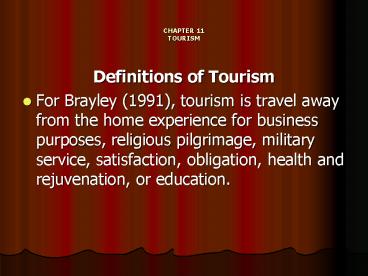CHAPTER 11 TOURISM - PowerPoint PPT Presentation
1 / 13
Title:
CHAPTER 11 TOURISM
Description:
... Brayley (1991), tourism is travel away from the home ... terms include travel for business, travel for pleasure, and travel to visit friends and family. ... – PowerPoint PPT presentation
Number of Views:358
Avg rating:3.0/5.0
Title: CHAPTER 11 TOURISM
1
CHAPTER 11TOURISM
- Definitions of Tourism
- For Brayley (1991), tourism is travel away from
the home experience for business purposes,
religious pilgrimage, military service,
satisfaction, obligation, health and
rejuvenation, or education.
2
CHAPTER 11TOURISM
- Definitions of Tourism
- For DAmore (1990 27), if properly designed and
developed, tourism can bridge the psychological
and cultural distances that separate people of
diverse races, colours, religions and stages of
economic and social development.
3
CHAPTER 11TOURISM
- Definitions of Tourism
- Mieczowski (1991) argues that recreation is the
motivating force behind tourism. Tourism is
about seeking pleasure and enjoyment through the
activities of leisure and recreation.
4
CHAPTER 11TOURISM
- Definitions of Tourism
- Tourism in Canada can be defined through a
composition of key terms used by the Canadian
Tourism Commission to measure tourism patterns in
Canada. These key terms include travel for
business, travel for pleasure, and travel to
visit friends and family.
5
CHAPTER 11TOURISM
- Tourism in Canada
- Tourism is a major player in the leisure and
recreation industry of Canada. - Tourism is a major income generator with a total
tourism Gross Domestic Product (GDP) of 22
billion reported in 2001. This translates into
2.3 of Canadas GDP (Canadian Tourism
Commission, 2001). - In 2001, tourism spending in Canada was 54.6
billion of which 70 or 38.4 billion was spent
by Canadians. Foreigners accounted for 16.2
billion or 30 (Canadian Tourism Commission,
2001). - Most international tourists in Canada come from
the United States, as geography plays a huge role
in determining who visits Canada. New York,
Michigan and Washington, the states bordering
Canada, are reported as the top states of origin
for U.S. tourists to Canada (Canadian Tourism
Commission, 2001). - Internationally, the top three overseas tourist
markets for Canada are, in rank order, the United
Kingdom, Japan and France.
6
CHAPTER 11TOURISM
- Tourism in Canada
- Most U.S. and international tourists visiting
Canada come during the third quarter of the year,
that is, during the months of July, August and
September (Canadian Tourism Commission, 2001).
The months of April, May and June comprise the
second most popular quarter for international
tourism to Canada (Canadian Tourism Commission,
2001). - According to the Canadian Tourism Commission
(2001), the main reason why U.S. and
international tourists visit Canada is for
holiday and/or vacation. Visiting friends or
relatives is the second most frequently reported
reason for visiting Canada, whereas, business
trips rank as the third most frequently stated
reason for visiting Canada by U.S. and
international tourists. - Most Canadian tourists who travel domestically
within Canada do so during the months of July,
August and September. The fourth quarter,
October, November and December, is the second
most frequent time period of the year for
domestic tourism as reported by the Canadian
Tourism Commission (2001). - Geography influences the travel destinations
selected by Canadians. Mexico, a country
geographically close to Canada, is the top
overseas country visited by Canadians.
7
CHAPTER 11TOURISM
- Tourism Trends in Canada
- Although it may still be too early to determine
the long-term impacts that September 11, 2001,
will have on travel and tourism, tourism data
released since that date indicate that it has
decreased dramatically, not only in Canada, but
also in Canadas key overseas markets. - According to Jim Watson, former President and CEO
of the Canadian Tourism Commission, the Canadian
Tourism Commissions ongoing marketing efforts,
along with initiatives to provide timely in-depth
information and analysis, are helping the
industry weather difficult times, even though a
full recovery is not expected until 2003
(Corporate Author, November 2002b 5). In fact,
as the Canadian Tourism Commission is placing a
significant amount of its budget on marketing and
marketing efforts, it is hoped that this will
assist in helping increase travel and tourism to
and from Canada.
8
CHAPTER 11TOURISM
- Canadian Tourism Commission
- Although the Canadian Tourism Commission has
existed since January 31, 1995, it was not until
2000 that the Canadian Tourism Commission Act was
passed. - The Canadian Tourism Commission is a part of
Industry Canada, a federal government department. - The objectives of the Canadian Tourism Commission
as stated in the Canadian Tourism Commission Act
(c. 28) are to - sustain a vibrant and profitable Canadian tourism
industry - market Canada as a desirable tourist destination
- support a cooperative relationship between the
private sector and the governments of Canada, the
provinces and territories with respect to
Canadian tourism and - provide information about Canadian tourism to the
private sector and to the governments of Canada,
the provinces and the territories.
9
CHAPTER 11TOURISM
- Special Interest Tourism
- Heritage Tourism
- A form of travel that has been used to explore
cultural heritage and/or enhance our cultural
identity (MacKay, 1999).
10
CHAPTER 11TOURISM
- Special Interest Tourism
- Sports Tourism
- The use of sports for touristic endeavors
(Kurtzman, 2001 16).
11
CHAPTER 11TOURISM
- Special Interest Tourism
- Cultural tourism
- Participation in a novel cultural experience.
Cultural tourism consists of the pursuit of the
touristic experience as a means to explore the
lifestyle and/or history of a given society or
group of people.
12
CHAPTER 11TOURISM
- Special Interest Tourism
- Educational tourism
- Is a special area of tourism that focuses on
learning and, in some cases, the earning of a
university credit.
13
CHAPTER 11TOURISM
- Special Interest Tourism
- Ecotourism
- The Canadian Environmental Advisory Council
defines ecotourism as follows Ecotourism is an
enlightened nature travel experience that
contributes to the conservation of the ecosystem,
while respecting the integrity of host societies
(Scace, Grifone and Usher, 1992 14).































